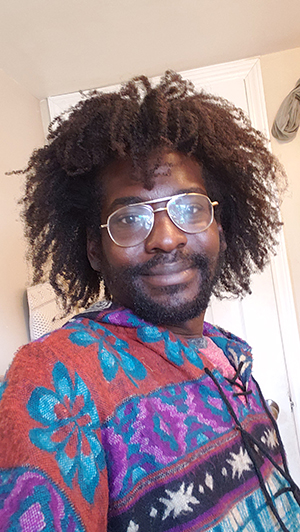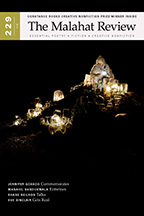Balance of Cultures: Catherine Mwitta in Conversation with Xaiver Campbell

Xaiver Campbell, whose story "Unda di Naseberry Tree" appears in The Malahat Review's summer issue #211, discusses building a narrative off of a short moment in time, incorporating more Patois, and the intersections of Judaism, Christianity, and sexuality in his Q&A with Malahat Review volunteer Catherine Mwitta. Read an excerpt of "Unda di Naseberry Tree."
Though Xaiver Michael Campbell was born and raised on the tropical island of Jamaica, Xaiver has considered Newfoundland and Labrador home for over a decade. Though both islands are quite different, Xaiver feels that living in Jamaica very much prepared him for life on the Rock — the people are equally warm and friendly. Xaiver reflects this love of his past and present life in his writing. When not writing, acting, singing or baking, Xaiver loves the outdoors and can be seen swimming in all the ponds in summer, camping in the woods and hiking the east coast trail. While Xaiver is new to writing, a short story of his, "Unda di Naseberry Tree," will be published in an upcoming anthology, title pending. He is currently enjoying writing stories and looks forward to where his stories will take him.
How was the process of conceptualizing “Unda di Naseberry Tree”? Though it’s fiction, does it have any personal connections that were important for you to include?
The story came about as a result of an assignment posed to my writing class by our instructor. We were told to think of a short moment in time punctuated by a longer stretch of time. And of course the moments needed to be connected in some way. And yes, it is totally fiction, but it was very crucial that the sense of yearning that Jermaine felt for Comoe be juxtaposed with basically everything else in his life, especially with his Mommy, and be felt in the story. Somewhere inside, Jermaine knew what he felt for Comoe was natural to feel, but only he thought that, so the constant fear/worrying felt real.
The story follows Jermaine over one summer during his childhood in Jamaica when he questions and subsequently discovers himself, despite prejudice against homosexuality. It’s told from the point of view of Jermaine as an adult, now living with his partner in Newfoundland. Use of both Patois and English also displays a melding of his upbringing and the man he’s become. How did you go about balancing languages and places and cultures within your story?
The version of the story now is so different from the version I first presented. Initially there was a lot less Patois. I was worried that no one would understand what the story was getting across because readers would get stuck on the fact that they don’t understand the dialect. Both white and non-white people shared this concern with me. However, as I edited the story it was clear to me that Jermaine needed to tell his story in the way he spoke as a child, even though it was from his perspective as an adult. Jermaine’s normal adult life is basically the polar opposite to what would be considered a normal life in Jamaica, therefore it made sense that he would depart from the dialect in his adult communications. Especially if those conversations are totally removed from any Jamaican context. It’s also often seen in Jamaican culture that people speak the dialect more as children and are pushed to speak “properly” in high school and beyond. The balance of cultures in the story comes from the fact that the life I have built in Newfoundland is a mixture of my upbringing in Jamaica and the different facets of Newfoundland I have internalized.
Religion and belonging are themes that run throughout this story, and we see that they’re also important to Jermaine. There is a transition from him saying, “People would kill me if dem know mi a battyman ca a suh it guh inna di Bible, Sodom an’ Gomorrah,” to telling his mother, “This is His plan for me.” Do themes of Christianity and queerness show up in your other work as well? Do you have any upcoming projects you’re working on now?
It’s funny to me that I write about religion, let alone the fact that other people notice it as much. It’s also funny that you mention Christianity because I am a practicing Jew, but my early life and pre-teen years in Jamaica were heavily influenced by Christianity. My work does tend to focus on the intersections of Judaism, Christianity, and sexuality. I have a short story titled “Prayer” coming out in 2021 in an anthology, Us, Now. I am also working on a short play about the epic snowstorm that rocked Newfoundland in Winter 2020; as well as a radio play about Covid-19.
Jermaine describes himself as a “battyman” when dealing with his first love as a boy in Jamaica, but eventually we see him living a comfortable life with his partner. Are there any books or works that inspired you for this piece on self-acceptance and exploring sexuality?
It took a lot of spiritual searching; reading the Torah and talking to God to fully come to terms with accepting myself, and furthermore, accepting that there is a world that my spirituality and sexuality coud live harmoniously. I am also really lucky to grow up seeing gay and lesbian representation on tv, whether a stereotypical flamboyant gay guy or otherwise. These shows were the moments I felt seen, found hope for adult life. As a teenager in the aughts, watching the kids on Degrassi also navigate sexuality and angst and depression and date rape made me want to tell stories that someone can relate to.
Catherine Mwitta
* * * * * * * *









